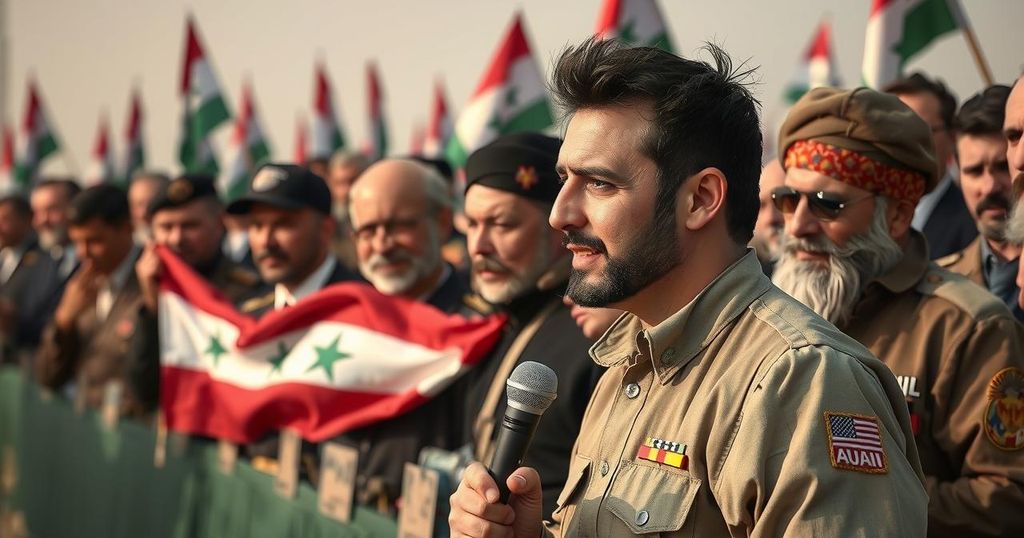Kurdish Factions Aim for Unified Representation in Post-Assad Syria

Kurdish groups in Syria are seeking to form a unified delegation for negotiations with new authorities in Damascus, amid ongoing divisions and external pressures, particularly from Turkey. A recent meeting between the ENKS and SDF aimed to address internal issues before presenting a collective front. Analysts warn that without a strong representation, Kurdish demands may go overlooked in the evolving political environment of post-Assad Syria.
In the context of ongoing divisions among Kurdish factions, leaders and analysts assert that Syrian Kurdish groups are aiming to establish a unified delegation for negotiations with the post-Assad Syrian authorities. The Kurdish region of northeast Syria has been primarily administered by the Syrian Democratic Forces (SDF) since 2012, a key ally of the United States in combating the Islamic State. The Democratic Union Party (PYD), which plays a pivotal role within the SDF, governs the area.
Contrarily, Turkey classifies these groups as extensions of the Kurdistan Workers’ Party (PKK), which it, along with the U.S. and EU, designates as a terrorist organization. Turkey’s significant role in shaping post-Assad Syria has led to threats of action against Kurdish factions failing to disarm. Another coalition, the Kurdish National Council (ENKS), which contests the de facto governance of the PYD, has established ties with Turkey and the ruling Kurdistan Democratic Party in Iraq.
Recently, a meeting between the ENKS and SDF took place, attended by officials from the U.S.-led coalition opposing IS. The purpose of this meeting was to formulate a collective Kurdish stance in relation to the emerging Syrian governance. President Sulaiman Oso of ENKS emphasized the need for transparent dialogue about contentious internal issues, citing a need to stop the arrest of ENKS members and attacks on their offices. “This was our first meeting with SDF commander Mazloum Abdi in four years,” he stated, emphasizing the necessity for trust-building between the factions.
As discussions continue, Oso has indicated that internal matters must be resolved prior to presenting a unified delegation to Damascus. The United States, United Kingdom, and France have urged both sides towards reaching an agreement, although none has made formal statements regarding their involvement in these dialogues. Meanwhile, Saleh Muslim from the PYD underscored the necessity of an inclusive Kurdish delegation that reflects the diverse ethnic and religious demographics of the region. The ENKS has dispatched representatives to Damascus to engage with community leaders, though they clarify that these are not meetings with new authorities dominated by Hayat Tahrir al-Sham (HTS), which has recently gained traction.
Political analysts caution that the protracted negotiations among Kurdish groups may hinder their efforts to secure a presence in Damascus. Cyber Saleh highlights the necessity of a unified Kurdish front, articulating that without it, Kurdish rights may be disregarded amidst rising Islamist authorities. While HTS leadership has vowed to uphold Kurdish rights, some HTS factions have dismissed the idea of federalism as a divisive strategy. Kurdish groups advocate for federalism to address their political aspirations and broader national challenges, a point that critics argue has not been effectively communicated among various Kurdish entities.
The article explores the dynamics among Syrian Kurdish factions, particularly in light of the changing political landscape following the fall of Bashar al-Assad. The Syrian Democratic Forces, closely affiliated with the U.S., have a controlling presence in northeast Syria, while tensions exist due to external perceptions, notably from Turkey, regarding Kurdish affiliations with groups like the PKK. Additionally, the Kurdish National Council (ENKS), which has differing positions from the PYD, plays a crucial role in the attempt to unify Kurdish representation in Damascus. The backdrop includes concerns about the rights of ethnic minorities in Syria, particularly amidst rising Islamist influences post-Assad. The ongoing dialogues represent not just political maneuvering but a bid for recognition and legitimacy within a rapidly evolving geopolitical context. The inclusion of various community representatives in discussions highlights the necessity for a coalition that reflects the diverse makeup of northeastern Syria.
In summary, Kurdish factions within Syria are striving for unified representation to advocate for their interests in negotiations with new authorities following the Assad regime. The complexity of internal divisions, external pressures, and the urgency of establishing trust between opposing factions complicate these efforts. Political analysts emphasize that achieving a cohesive and representative Kurdish stance is vital to ensure that Kurdish rights are recognized in the new political landscape of Syria. The United States and its allies continue to support this pursuit amid significant geopolitical challenges.
Original Source: www.voanews.com








